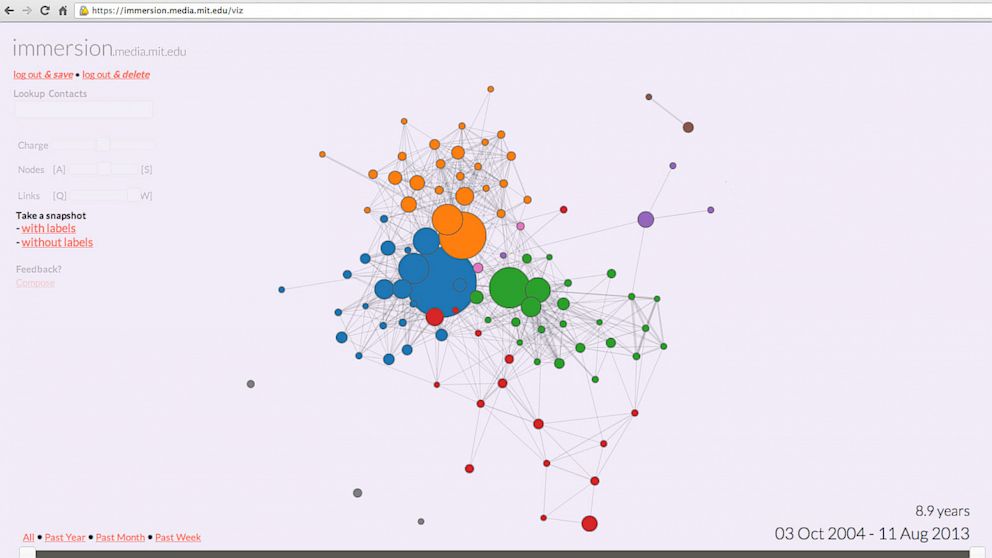App of the Week: Immersion
The app gives you a graphical depiction of your social network.

Aug. 18, 2013 — -- App Name: Immersion
Available Platforms: Desktop
Price: Free
What does this app do?: Considering how much time people spend reading and writing emails throughout a typical work day --- around 13 hours in an average work week according to some estimates--your email may be your largest social networking tool.
It's a concept two graduate students at MIT's Media Laboratory, Daniel Smilkov and Deepak Jagdish, and their adviser, Cesar Hidalgo explored recently through a program called Immersion. A desktop app, Immersion uses a set of algorithms the team wrote to analyze a user's Google mail account, and then presents a visual representation of who the most important people in your life are, or at least in your mailbox.
Smilkov explains the idea for Immersion came about as the MIT trio began to examine the possibility of email as an intricate and powerful network. Unlike social network sites like Facebook, which are typically comprised of a person's friends and family, email clients often contain many more work connections, too.
"People are constantly emailing and messaging each other," said Smilkov. "We wanted to show people that email is a rich and underexplored data field."
To use the app, log onto the website and grant Immersion permission to access your Google mail account. The app gets to work culling through the metadata in your email, the "To," "From," and "CC" fields, and the timestamps of each email you sent and received over the years.
Once Immersion finishes crunching on that data, it renders a map of your network portraying a colorful array of dots of varying sizes and colors linked together by a web of lines representing the connections between you and the people you know.
The result is like viewing a graphical depiction of the solar system; those closest to us, or those we contact the most, appear as larger dots and those further away, presumably our weaker connections, appear as smaller dots, like a minutely visible star or planet might appear in the night sky.
Naturally, an app like Immersion raises concerns about privacy, but Smilkov asserts the program only looks at the metadata in emails, not the content. Once the app completes its task, users can delete the metadata and remove the permission to access your account.
Smilkov says one of the values of something like Immersion lies in its ability to allow people to reflect on their network; Because the app analyzes every email you sent and received from the moment you created your account, it will show who the most important people were in your life over the years and with whom you may have lost touch.
Perhaps Immersion will inspire you to reconnect with people, or remind you not to spend as much time absorbed by work.
Immersion launched just over a month ago and has already seen 600, 000 visitors, according to Smilkov.
Although the team does not have immediate plans to make it available for mobile phones, they do plan to offer support for additional email clients, including Yahoo, Hotmail, and Microsoft Exchange.
Is it easy to install?: To use Immersion, log onto the website and allow the app to access your Google mail account.
Should I try it?: Immersion provides a vivid portrait of your connections in a matter of moments, and while Smilkov says most people are not surprised by the results, it's still fun to see the circles of people in your life represented in this colorful way. Whether or not Smilkov and his co-creators at MIT continue to develop Immersion , the app provides users with an imaginative and immediate understanding of our network and reminds us that behind all of that email metadata are real, true human connections.




